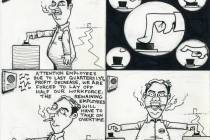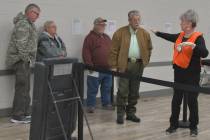Op-ed: Program offers free drinking water well assessments
Private well owners who rely on their wells for drinking water in specific counties in Nevada are eligible to participate in Rural Community Assistance Corporation’s (RCAC) Individual Well Program, which provides free private well assessments for those not regulated by the Safe Drinking Water Act.
During 2017, RCAC staff will perform well assessments for well owners in Nevada, Arizona, Idaho, Oregon, and California.
Various counties in each of the states have been chosen for the Individual Well Program, including Nye and Churchill counties in Nevada.
A well assessment is an evaluation of a well’s on-site conditions to help owners learn how to keep their drinking water safe. Some common contaminants found in domestic wells include arsenic, uranium, boron, lithium and radionuclides.
Drinking contaminated water can cause a deficiency in cognitive development in infants and young children leading to lifelong learning disabilities, cancer, thyroid problems and other serious health issues.
Assessments include possible contamination sources, such as nearby agriculture and septic systems, visual inspection, well construction and free water quality testing for nitrates.
Trained professionals will perform in-person visual inspections to check for proper sanitary seals, a well cap screen and casing to reduce the risk of well water contamination.
RCAC’s staff will perform sanitary surveys, water quality surveys and test for nitrates at each assessment.
The sanitary surveys will include inspection for well vulnerability based on the well specification, surrounding contamination sources at the well sites and proper well construction.
The water quality survey will educate the well owner on the hydrology of their groundwater basin and common water quality contaminants in their area.
After the assessment, the well owners receive a copy of all information accessed and gathered so that they can better understand their water source, helping to ensure that their well drinking water is reliable and safe.
An estimated 43 million people in the U.S. rely on private water wells as their sole drinking water source, according to a U.S. Geological Survey, and the free well assessments provided by the IWP can help to identify potential threats before they become hazardous to water quality and safety.
RCAC will offer a free well owner workshop in Pahrump on April 22 from 8:30 a.m. to 12:30 p.m. at the Bob Ruud Community Center.
The well owner workshop will train well owners on septic and well system proper operation and maintenance, common septic and well troubleshooting problems and solutions and how groundwater flows and recharges the aquifers.
For updates on the workshop, to request an assessment or find out more about the program visit http://www.rcac.org/environmental/individual-well-program/.
Thi Pham is project coordinator for the Rural Community Assistance Corporation’s Individual Well Program. For more information about RCAC, please visit rcac.org.
















